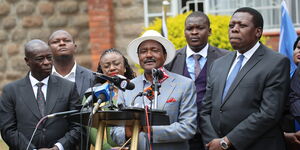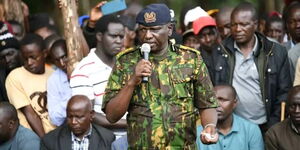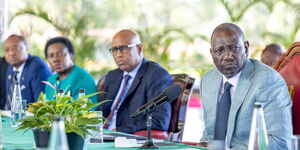President William Ruto's trip to Burundi on Thursday for the 23rd Heads of State and Government Summit of the Common Market for Eastern and Southern Africa (COMESA) raised important legal questions about who was in charge of the country during his absence.
This comes in the wake of Deputy President Rigathi Gachagua's ongoing impeachment court cases and the uncertainty surrounding the nomination of Kithure Kindiki for the position of second in command.
Gachagua was ousted from office on October 18 after the Senate voted to impeach him on five of 11 charges brought forth by Kibwezi West Member of Parliament Mwengi Mutuse. The decision followed a vote by the National Assembly who overwhelmingly voted to oust the embattled Deputy President.
With this in mind, it begs the question of who is in charge of the country in the absence of both a President and a Deputy President.
As Gachagua aims to exploit every legal loophole in court to salvage his political career, he is, by law, now contesting as a civilian following the Senate's vote to remove him from office.
What the law says:
Article 146 of the Constitution tackles the question of the Vacancy of the Office of the President and his Deputy.
As per the Constitution, "When a vacancy occurs in the office of President, the Deputy President shall assume office as President for the remainder of the term of the President."
"If the office of Deputy President is vacant, or the Deputy President is unable to assume the office of President, the Speaker of the National Assembly shall act as President and an election to the office of President."
These provisions, however, pre-dominantly take effect when in the event that the President or his Deputy are both impeached, resign or pass away. There is no specific mention of what happens when the Head of State is out of the country.
If the constitution is anything to go by, Moses Wetangula is by law currently in charge of the country, at least for the next 36 hours, since the law says the Speaker of the National Assembly can act as President when the President and the Deputy President seat is declared vacant.
However, according to Javas Bigambo, a legal expert who spoke exclusively to Kenyans.co.ke, the county is at risk of a constitutional crisis with the current state of affairs.
"Rigathi Gachagua is factually impeached," Bigambo explained, adding that the third in command in the absence of President Ruto and Gachagua is the Speaker of the National Assembly.
"But now since we do not have a functional IEBC, we are risking a constitutional crisis because the Speaker of the National Assembly can only be in charge of the country for three months if (God forbid) anything happens to the President," he added.
"Because of the conservatory orders barring Kindiki from assuming office, he does not have the powers of a Deputy President. This leaves the affairs of the country to the third in command who is the Speaker of the National Assembly."
Meanwhile, Bigambo dismissed any provisions for the Prime Cabinet Secretary(PCS) Musalia Mudavadi to take over as the third in command, maintaining that there is no provision for his position(PCS) in the constitution.
This happens as the embattled Gachagua is set to know his fate on Thursday, when a three-judge bench comprising of Justices Antony Mrima, Eric Ogola and Freda Mugambi will decide on whether to remove or stay the conservatory orders blocking the swearing-in of nominated Deputy President Kithure Kindiki.












